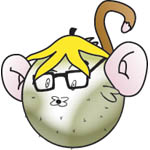Monkeying Around
Back to Contents of Issue: March 2004
|
|
|
|
|
|
|
PARLEZ-VOUS ANGLAIS? IT would seem that the chance of a Japanese being able to converse in a foreign language depends on which university he or she attended. The new year's first issue of Sunday Mainichi magazine rated the top five institutions placing emphasis on foreign language ability as follows: International Christian University (39 votes); Sophia U. (34); Keio U. (25); Waseda U. (22) and Kansei Gakuin U. (15). The top five schools rated best in the IT sector were Keio U.; Nagoya Commercial Institute; Ritsumeikan U.; Chuo U. and Hosei U. Incidentally, five universities placed an amazing 100 percent of their students in jobs by graduation. These were Toyoda Institute of Technology (Aichi Pref.); Nara School of Medicine (Nara); Daido Institute of Technology (Aichi); Nagaoka Institute of Physics (Niigata) and Toyama University (Toyama).
OH, DEAR. TELEPHONE SMUT and other sexy services are roping in younger Japanese men by the tens of thousands. The National Consumer Affairs Center of Japan, which last October became an independent agency with a staff of 126, reported that during 2002 it received more complaints over disputed charges for so-called "telephone information services" by men in their teens through their 30s than any other type of complaint. By age segment, 15,698 men under 20; 29,621 men from 20 to 29, and 29,072 men from 30 to 39 asked the center for assistance over disputes from these aggressively marketed services. That adds up to more complaints than all the rest, male and female, put together.
WITH 9.93 MILLION JAPANESE born in the current year of the monkey, homo sapiens are in no danger of extinction. But they rank only 10th in terms of the animal population, according to the Chinese sexagenary cycle. The Asahi Shimbun of New Year's Day noted that Japanese born in 1896, 1908, 1920, 1932, 1944, 1956, 1968, 1980 and 1992 total approximately 4.82 million males and 5.11 million females. Of these, the largest number -- 18.4 percent -- was born in 1968. Those turning 24 this year will account for 1.83 million. Due to the declining birth rate, 12-year-olds will only number 1.2 million -- or 12.1 percent of the monkey total. Start monkeying around!
OKAY YOU TAX CHEATS, we know where you are. Mild mannered and bespectacled, Takashi Kadokura is indeed a superman in disguise when it comes to tracking where Japan's underground money goes. The analyst for the Daiichi Research Institute last year published a 96-page "White Paper on Japan's Underground Economy" (Yosensha). Among the fascinating data is a top 10 listing of Japan's biggest tax evaders, broken down by type of business. Leading the pack, with an average of JPY3.505 billion shortfall per company or individual reporting during calendar 2001 (the latest year for which data is available), were moneylenders. This was followed by the sex business (JPY2.13 billion); hospitals (JPY2.061 billion); scrap metal dealers (JPY1.817 billion); snack establishments (JPY1.532 billion); bars (JPY1.071 billion); legal offices (JPY1.065 billion); meat retailers (JPY1.049 billion); undertakers (JPY1.035 billion) and temporary job placement services (JPY999 million).
NOTED IN PASSING: ACCORDING to Reporters Without Borders, which operates nine national sections and has more than a hundred correspondents worldwide, Japan's press freedom index fell from 26th to 44th place worldwide in 2003. (If it's any consolation, the rest of Asia fared even worse.) The annual index is drawn up by asking journalists, researchers and legal experts to answer 50 questions about a range of possible violations of press freedom, including censorship, the murders or arrests of journalists, state monopolies and the punishment of press law offenses. The top place was shared by four north European countries: Finland, Iceland, Norway and the Netherlands, which were followed, in descending order, by Denmark, Trinidad and Tobago, Belgium, Germany, Sweden and Canada. The countries with least press freedom were Vietnam (ranked 159th), followed by Iran, China, Eritrea, Laos, Burma, Cuba and North Korea (166th). But prepare yourselves for change, folks: World Press Freedom Day falls on May 3.
@ |
|
Note: The function "email this page" is currently not supported for this page.


 EXCUSE MY ALLITERATION FOR a moment, but it's a proven point that Japanese crave cuddling cute cartoon characters. A recent survey of people in their 50s and 60s appearing in the Asahi Shimbun finds an overwhelming 96 percent have a favorite. Topping the list was Sazae-san, the late Machiko Hasegawa's archetypal homemaker, cited by 55.1 percent. The following cartoon characters were the most popular: Doraemon (a blue robot cat), 54.7 percent; Mickey Mouse (53.6 percent); Snoopy (44.6 percent); Astro Boy (39.3 percent); Winnie the Pooh (35.5 percent); Moomin (31.6 percent) and Hello Kitty (31.4 percent).
EXCUSE MY ALLITERATION FOR a moment, but it's a proven point that Japanese crave cuddling cute cartoon characters. A recent survey of people in their 50s and 60s appearing in the Asahi Shimbun finds an overwhelming 96 percent have a favorite. Topping the list was Sazae-san, the late Machiko Hasegawa's archetypal homemaker, cited by 55.1 percent. The following cartoon characters were the most popular: Doraemon (a blue robot cat), 54.7 percent; Mickey Mouse (53.6 percent); Snoopy (44.6 percent); Astro Boy (39.3 percent); Winnie the Pooh (35.5 percent); Moomin (31.6 percent) and Hello Kitty (31.4 percent).



